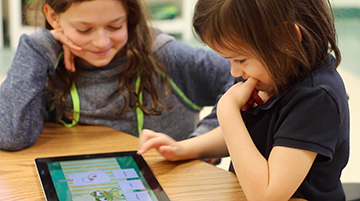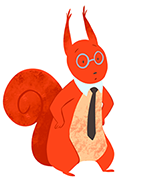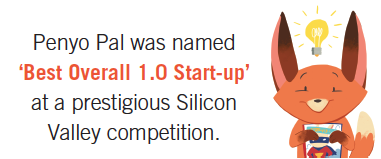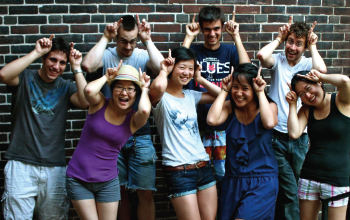Games That Teach, No Nagging Required

What's a nice girl like Jane Wu doing, living in a big house in Toronto’s suburbs with seven guys? The big house is a social experiment in action, a mix of young entrepreneurs, some who lease office space, and some, like Jane and her business partner, Rafal Dittwald, who live and work there.
“We’re doing the Facebook/Social Network thing,” Jane laughs, referring to the film about Facebook founder Mark Zuckerberg. “We joke that we have a lot less money and we’re a lot less attractive.”
Jane and Rafal are living the entrepreneur’s dream of building Penyo Pal, their tech start-up that has garnered awards, rave reviews and the attention of Forbes Magazine, the National Post, The Globe & Mail, BNN and CBC.
Penyo Pal delivers digital stories that are educational and entertaining for children. Led by an animated character named Penyo Pal, young children practise reading, using tablets and smart phones, to improve their literacy in English, French and Mandarin.
It’s not the career path one might have predicted for this high-achieving Calgary native. Jane could have had her pick of jobs during the recruiting season that brings the cream of corporate Canada to QSB to hire the best and the brightest of the Commerce graduating class.
Jane’s resumé would surely have landed at the top of any recruiter’s pile: Chancellor’s Scholar (one of only 50 scholarship recipients nominated as the best student in their Canadian high school’s graduating class); Cansbridge Fellow Summer Associate (a plum summer job in Hong Kong with Avantage Ventures, made possible through the generosity of MBA’87 graduate William Yu); Valedictorian of The Next 36 in 2012 (a very big deal — more on this life-changing experience follows); recipient of a TD Scholarship for Community Leadership (a prestigious national scholarship that covered all her tuition and a portion of her living expenses through her four years in Commerce); Canada’s Top Teen Philanthropist in 2008 (cited for her role in having founded Beauty and Brains, a program to inspire young women in Calgary, an initiative since adopted by the Telus World of Science). And, oh yes, she’s also a Queen Elizabeth II Golden Jubilee medal recipient, recognized for her many contributions to her community.
 Jane excelled at QSB, as a fourth-year student who landed on the Dean’s List (with distinction, the highest level of academic achievement), and through her involvement in extracurricular activities, such as the Queen’s Women in Leadership conference and Commerce Outreach, the Commerce Society’s philanthropic arm. She broadened her horizons by spending her entire third year studying at Herstmonceux Castle in the UK and HEC in Paris. As a Cansbridge Fellow and the only Canadian and only undergraduate intern at Avantage Ventures in Hong Kong, she made her mark by planning the first Social Investment Forum in China and working on social enterprise projects in Bhutan, Vietnam and China.
Jane excelled at QSB, as a fourth-year student who landed on the Dean’s List (with distinction, the highest level of academic achievement), and through her involvement in extracurricular activities, such as the Queen’s Women in Leadership conference and Commerce Outreach, the Commerce Society’s philanthropic arm. She broadened her horizons by spending her entire third year studying at Herstmonceux Castle in the UK and HEC in Paris. As a Cansbridge Fellow and the only Canadian and only undergraduate intern at Avantage Ventures in Hong Kong, she made her mark by planning the first Social Investment Forum in China and working on social enterprise projects in Bhutan, Vietnam and China.
In her graduating year, she took advantage of on-campus recruiting sessions that bring top firms to campus to hire QSB graduating students. She was gravitating toward a career in management consulting when opportunity, of a completely different type, knocked.
At the start of her fourth year, Jane had applied to The Next 36, having heard about it from program alumni Emily Dimytosh, BCom’12, and Dan McCann, BCom’11. Championed by founding patrons W. Galen Weston, Paul Desmarais Sr., Jimmy Pattison and a long list of prominent Canadian business leaders, The Next 36 is billed as “Canada’s entrepreneurial leadership initiative.” This annual program selects 36 promising undergraduates from a variety of academic disciplines after a rigorous national selection process. The young entrepreneurs are then grouped into teams of three or four to build a business in the mobile or tablet space. For eight months, they are provided with mentoring by some of Canada’s top business leaders, up to $80,000 cash from venture capitalists, and a comprehensive offering of in-kind resources.
Both Emily and Dan sang the program’s praises and promised it would be a transformative experience if Jane were to nab one of the coveted spots. Jane was among the 72 finalists brought to Toronto, all expenses paid, for the final selection weekend in November 2011. It was an intense experience that saw the field whittled down to The Next 36, of which Jane was thrilled to be one. She was soon paired with her teammates Jessica Fan, a BBA Joint Major in Interaction Design and Business Administration from Simon Fraser University; Rafal Dittwald, an Engineering Science student at the University of Toronto; and Ryan Wagner, a University of Waterloo, Nanotechnology Engineering major.
 They lost little time in coming up with a business idea. They discovered that they all shared a passion for using technology to improve educational accessibility. “We were reminiscing about our younger days,” Jane recalls. “We had all tried to learn Mandarin and/or French in school. It was overwhelming and often just plain boring.” After researching current methodologies in teaching a second language, they learned that little had changed. Meanwhile, it was difficult to miss the proliferation of young kids glued to their mobile phones or tablets, spending hours playing games. “We wondered how powerful it would be to channel even a tiny fraction of that time into something just as fun but more educational.” That led to the idea of Penyo Pal, providers of mobile apps and resources that combine language technology and play to create games and interactive stories that change the way kids learn language.
They lost little time in coming up with a business idea. They discovered that they all shared a passion for using technology to improve educational accessibility. “We were reminiscing about our younger days,” Jane recalls. “We had all tried to learn Mandarin and/or French in school. It was overwhelming and often just plain boring.” After researching current methodologies in teaching a second language, they learned that little had changed. Meanwhile, it was difficult to miss the proliferation of young kids glued to their mobile phones or tablets, spending hours playing games. “We wondered how powerful it would be to channel even a tiny fraction of that time into something just as fun but more educational.” That led to the idea of Penyo Pal, providers of mobile apps and resources that combine language technology and play to create games and interactive stories that change the way kids learn language.
The next five months were all-consuming. “During my last term, I became very anti-social. My roommates didn’t see much of me after I made it into the program,” Jane laughs. Her team collaborated via email and Skype, took online courses and connected with The Next 36 mentors. With funding of $80,000 ($50,000 directly from The Next 36 and $30,000 from its partnership with the Federal Economic Development Agency for Southern Ontario), they juggled their coursework while spending every other available moment working on their startup. In May, as a freshly minted BCom grad, Jane joined the rest of The Next 36 cohort and moved into a residence at U of T. Teams continued to work on their ventures, attended classes led by faculty from Harvard, MIT, and U of T, among other world class institutions, and took advantage of networking events with Canadian business leaders. One such event, the Women Leaders Luncheon, with special guest Margaret Atwood, was a highlight for Jane, as was Venture Day, the culmination of the program. At this Aug. 14 event, all participants pitched their start-ups to investors and business leaders from across North America. This was their chance to make an impression on an audience of 700 attending via webcast or in person at Toronto’s MaRS Discovery District.
 Penyo Pal scored well on several fronts. The team’s presentation wowed on its merits, but also had the added cachet of having been named ‘Best Overall 1.0 Startup’ at Launch EDU in Silicon Valley in June. Of the 300 start-ups vying for the honour, Jane and Rafal were the youngest presenters and represented the only Canadian venture chosen to pitch its business. They shared the spotlight with start-ups that had raised more than $10 million in capital or whose founders had delivered TED talks. The audience at The Next 36’s Venture Day in August was equally impressed. Jane was selected by her peers to be Valedictorian and fellow co-founder Rafal was named the Satchu Prize-winner, the highest individual honour bestowed by the program, and won the previous year by Emily Dimytosh.
Penyo Pal scored well on several fronts. The team’s presentation wowed on its merits, but also had the added cachet of having been named ‘Best Overall 1.0 Startup’ at Launch EDU in Silicon Valley in June. Of the 300 start-ups vying for the honour, Jane and Rafal were the youngest presenters and represented the only Canadian venture chosen to pitch its business. They shared the spotlight with start-ups that had raised more than $10 million in capital or whose founders had delivered TED talks. The audience at The Next 36’s Venture Day in August was equally impressed. Jane was selected by her peers to be Valedictorian and fellow co-founder Rafal was named the Satchu Prize-winner, the highest individual honour bestowed by the program, and won the previous year by Emily Dimytosh.
The intangible benefits of participating in the program were as invaluable to the co-founders as the financial ones. Tapping into a network of advisors and mentors with first-hand experience in launching their own successful ventures offered insights and encouragement that boosted the team’s morale and motivation. One of the team’s more enthusiastic supporters was Alex Moorhead, BCom’91, Managing Partner of Toronto-based Tandem Expansion Fund, one of Canada’s largest venture capital firms. “Ten minutes of his time is worth a lot,” says Jane. “He not only spent hours poring over our business strategy, he also helped us with our personal goals.”
“Working with Jane, Raf and the rest of the Penyo Pal team was a great experience,” says Alex. “I learned a lot from these talented young executives. It was a real privilege to contribute in some small way to their future success.”
At the program’s conclusion in August came decision time; would Jane make the same choice as two of Penyo Pal’s co-founders by taking a corporate job, or would she join Rafal in taking the business to the next level? In June, the team had launched its first game, Food Frenzy, on the Apple App and Google Play stores, and early reviews were more than encouraging.
 Jane (third from right) and Rafal (top, second from right), along with interns and Next 36 participants, do impressions of the pointy-eared Penyo Pal character as a team-building exercise.“I remember thinking, ‘I’ve got no kids, no mortgage, I’m already used to living like a college student, pinching my pennies,” Jane recalls. “I’d always wanted to start my own business; I just didn’t think I would be doing it straight out of school. I thought I’d work for a few years, earn enough money and then do it. But I figured this was actually the best timing. I often tell friends, ‘I don’t want to have a midlife crisis — I want to be able to say I gave it a shot.”
Jane (third from right) and Rafal (top, second from right), along with interns and Next 36 participants, do impressions of the pointy-eared Penyo Pal character as a team-building exercise.“I remember thinking, ‘I’ve got no kids, no mortgage, I’m already used to living like a college student, pinching my pennies,” Jane recalls. “I’d always wanted to start my own business; I just didn’t think I would be doing it straight out of school. I thought I’d work for a few years, earn enough money and then do it. But I figured this was actually the best timing. I often tell friends, ‘I don’t want to have a midlife crisis — I want to be able to say I gave it a shot.”
The decision to rent a house large enough to sublet rooms certainly made sound economic sense to Jane and Rafal. “We got a great deal on our rent,” Jane explains. “For the same price, we could probably get just a bachelor pad downtown.”
The house soon filled up with like-minded tenants, one of whom is a fellow Next 36 alumnus, another a founder of a videography start-up. “We throw business leads each other’s way and are all really focused on getting our ventures off the ground,” says Jane. Their home’s minimalist décor reflects their budget-consciousness. Furniture was found on Craig’s List and Kijiji, with donations also gratefully accepted. “Alex Moorhead donated a beautiful wood table, affectionately known as Alex’s table, even though it’s being used as a desk,” says Jane.
Their initial seed funding is holding out and investors who’ve expressed an interest have been politely declined. “We’ve been offered investment funding several times,” Jane admits. “Right now, we’re trying to bootstrap it, that is, generate revenues from our own games and other products to sustain ourselves.”
In the months since their social experiment began, Penyo Pal has grown with the addition of a web developer and part-time illustrator. Two Rotman MBA students have donated their services as the venture has grown from its initial offering to its current slate of games and downloadable crafts, worksheets, and activities in Mandarin and French, and for the English-as-a- second-language [ESL] audience.
 Like many tech start-ups, this one eschews the usual corporate hierarchy and titles. Jane is ‘Co-founder and Chief Happiness Officer” to Rafal’s ‘Co-founder and Chief Code Wrangler.’ Jane explains her moniker: “It sounds fluffy, but what it comes down to is this: As a start-up, our earliest customers are the people whom we absolutely have to satisfy; we have to ensure they’re delighted. I’ve been getting into the heads of parents and kids and working with teachers to understand what they want and need. The other element of my job is ensuring that our team is in a really good place in terms of morale,” she says. There’s also a lot of pitching in to do whatever is needed to keep the business moving forward.
Like many tech start-ups, this one eschews the usual corporate hierarchy and titles. Jane is ‘Co-founder and Chief Happiness Officer” to Rafal’s ‘Co-founder and Chief Code Wrangler.’ Jane explains her moniker: “It sounds fluffy, but what it comes down to is this: As a start-up, our earliest customers are the people whom we absolutely have to satisfy; we have to ensure they’re delighted. I’ve been getting into the heads of parents and kids and working with teachers to understand what they want and need. The other element of my job is ensuring that our team is in a really good place in terms of morale,” she says. There’s also a lot of pitching in to do whatever is needed to keep the business moving forward.
“There’s no better way to learn about business than by doing it,” Jane says. “That’s what Professor John Pliniussen used to say in my Com132 class, and I’ll always remember it. I learned so much in Commerce, but it’s only been since I’ve applied it (to Penyo Pal) that I realize just how valuable those lessons were. It wasn’t until I started living it that I realized what a great foundation I have for starting my own business.”

